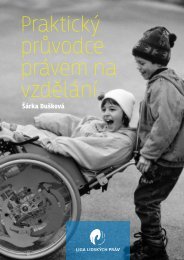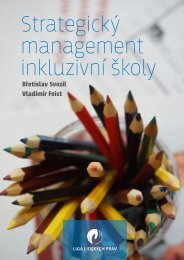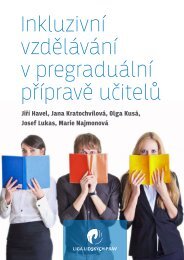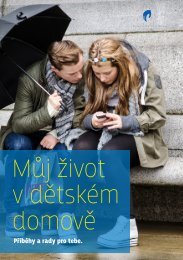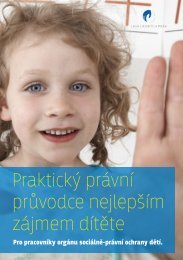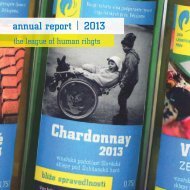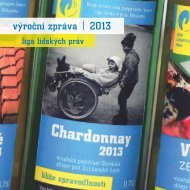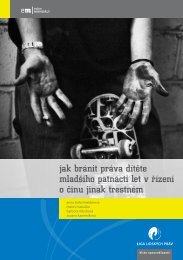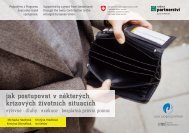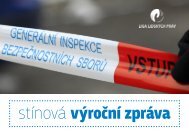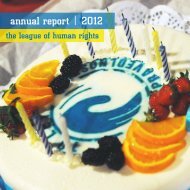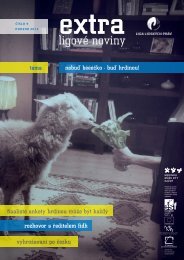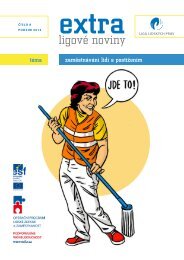EXTRA league papers | issue 3 | winter 2010 | What Schools Do We Want for our Children?
You also want an ePaper? Increase the reach of your titles
YUMPU automatically turns print PDFs into web optimized ePapers that Google loves.
6<br />
interview<br />
questions <strong>for</strong>…<br />
…Josef <strong>Do</strong>beš, the Minister of Education<br />
How do you think an ideal school <strong>for</strong> y<strong>our</strong> children<br />
should look like?<br />
Above all, it would be a friendly environment<br />
created by teachers, parents and children. It<br />
would be a school where children could be freely<br />
educated without being manipulated. And<br />
at the same time it would be a safe place where<br />
children could explore all their possibilities.<br />
Candidates <strong>for</strong> the “Fair School” Award<br />
are better and better<br />
In the past month LIGA teachers visited new<br />
schools, which aim to be awarded the Fair School<br />
Certifi cate. They travelled the whole country<br />
and returned home satisfi ed. “I was pleasantly<br />
surprised by the high level of application of inclusive<br />
principles at schools. Most schools try to<br />
put into practice the philosophy and principles of<br />
equal access to education,” says Monika Tannenbergerová.<br />
At present, fi fteen schools from all<br />
over the Czech Republic have applied <strong>for</strong> the<br />
Certifi cate and applications still keep coming.<br />
Our pedagogical-legal team explains to the<br />
schools what they can expect and clarifi es any<br />
possible ambiguities. Throughout the year we<br />
counsel the schools engaged in the project and<br />
we watch how the inclusion goes at the schools.<br />
Whether the Certificate is awarded or not is<br />
decided by an independent board of experts.<br />
LIGA awards the Fair School Certifi cate to those<br />
schools that promote a fair approach to all pupils<br />
regardless of their handicap, special skills or<br />
skin col<strong>our</strong>. Since 2009 ten schools were awarded<br />
the Certifi cate and other schools joined the<br />
project this year.<br />
<strong>What</strong> do you think about inclusive education as a<br />
system? <strong>What</strong>, in y<strong>our</strong> opinion, is the signifi cance<br />
of the process of inclusion <strong>for</strong> society?<br />
Inclusion or integration of handicapped children<br />
is a completely proper process, it is necessary<br />
that this process take place in an entirely<br />
transparent way and that inclusion become an<br />
open dialogue between experts, representatives<br />
of regions and schools, and parents.<br />
<strong>Do</strong> you think that Czech special and practical<br />
elementary schools are really attended only by<br />
children who belong there?<br />
It would be naive to think that it is so. I will only<br />
confi rm the numbers, which I do not consider to<br />
be exaggerated, that 26 per cent of the children,<br />
who attend these schools, do not have any intellectual<br />
disability. It is a wrong approach. On<br />
the other hand, I fully support special schools,<br />
because they work in fairly diffi cult conditions<br />
and without appropriate acknowledgement<br />
and support.<br />
<strong>What</strong> is y<strong>our</strong> opinion of the D. H. verdict, and<br />
what solution would you propose, as a solution<br />
is inevitable according to the Strasb<strong>our</strong>g recommendation?<br />
The substance of the D. H. verdict is that children<br />
without intellectual disability should not<br />
be placed outside mainstream education. This is<br />
a matter to be considered and solved by Regulations<br />
No. 72 and 73, which need to be amended.<br />
<strong>We</strong> can achieve this by the end of January 2011.<br />
<strong>We</strong> achieved a signifi cant decision: Parents<br />
do not have to pay fines <strong>for</strong> not<br />
having their child vaccinated<br />
Parents who decide not to have their children<br />
vaccinated or to postpone the vaccination, can<br />
no longer be fi ned. This was the decision of the<br />
Supreme Administrative C<strong>our</strong>t, which accepted<br />
the arguments of LIGA that the Regulation on<br />
vaccination against infectious diseases is in<br />
contradiction with constitutional law. This puts<br />
an end to an often insensitive practice of health<br />
offi cials who imposed fi nes of up to 20,000 CZK<br />
on parents who refused to get their children<br />
vaccinated or to postpone the vaccination, even<br />
in cases the parents’ decision was based on the<br />
child’s bad reaction to a previous vaccination.<br />
“If the State wishes to en<strong>for</strong>ce this duty, this would<br />
have to be regulated by law,” says Josef Vlašín, a<br />
judge at the Supreme Administrative C<strong>our</strong>t.<br />
The ground-breaking verdict has been reached<br />
in the case of the Čechs who refused vaccination<br />
and were ordered by the Offi ce of Public Health<br />
to pay a fi ne of 8,000 CZK. Mr and Mrs Čech<br />
decided to defend themselves in c<strong>our</strong>t with the<br />
help of LIGA lawyers. After two years, success<br />
finally came and it can positively influence<br />
other similar litigations. The rights of patients to<br />
decide whether to get vaccinations or not has<br />
<strong>What</strong> will the progress of the National Action<br />
Plan on Inclusive Education be now that some of<br />
the experts, who collaborated on its drafting and<br />
realization, have left?<br />
It has to be said that the so-called NAPIV (National<br />
Action Plan on Inclusive Education) was<br />
prepared only in March <strong>2010</strong>. It took a very long<br />
time be<strong>for</strong>e the plan was created, the people<br />
engaged in the plan met once (June <strong>2010</strong>) and<br />
then somebody leaves. In my opinion, this is<br />
a short-term matter and I rather appreciate<br />
long-term projects. I will call NAPIV at the end of<br />
November <strong>2010</strong> and will gladly invite anybody<br />
who wants to continue with the project. I wish<br />
it were mostly perseverant and determined<br />
people.<br />
<strong>Do</strong> you think that education towards tolerance<br />
and removal of xenophobia and racism is suffi cient<br />
at schools?<br />
Generally speaking, it is necessary to put more<br />
eff ort in this matter, and not only at schools but<br />
also in families, sports fi elds (see sports stadiums).<br />
<strong>We</strong> can undoubtedly observe a certain<br />
progress and openness regarding this <strong>issue</strong>.<br />
Progress is achieved with regard to the attitude<br />
of the repressive organs, where a significant<br />
shift has been noted, because this environment<br />
is far less tolerant. But it is necessary not to stop<br />
focusing on this <strong>issue</strong> because it still represents<br />
a great danger <strong>for</strong> society.<br />
in short<br />
been a long-term <strong>issue</strong> <strong>for</strong> LIGA. “<strong>We</strong> think that<br />
the current legislation does not respect human<br />
rights. This repressive system is uncommon in all<br />
<strong>We</strong>stern countries,” says Zuzana Candigliota, a<br />
LIGA lawyer.<br />
Human Rights Clinic working again<br />
With the beginning of the new academic<br />
year LIGA introduced another c<strong>our</strong>se entitled<br />
Human Rights Clinic offered in cooperation<br />
with the Faculty of Law of Palacký University<br />
in Olomouc, with which LIGA cooperates on a<br />
long-term basis. David Zahumenský, the LIGA<br />
Chair, advised the students how to conduct an<br />
interview with a client. He also gave them some<br />
essential facts about health law. Within a threeh<strong>our</strong><br />
session the students had the opportunity<br />
to apply the acquired knowledge and skills in<br />
practice.<br />
The goal of the clinic is to use interactive methods<br />
to introduce students to the <strong>issue</strong> of<br />
human rights and their legal protection. At the<br />
same time the c<strong>our</strong>se aims to give the students<br />
practical legal skills and inspire them with a<br />
sense of professional responsibility towards<br />
disadvantaged social groups and public interest<br />
protection.




